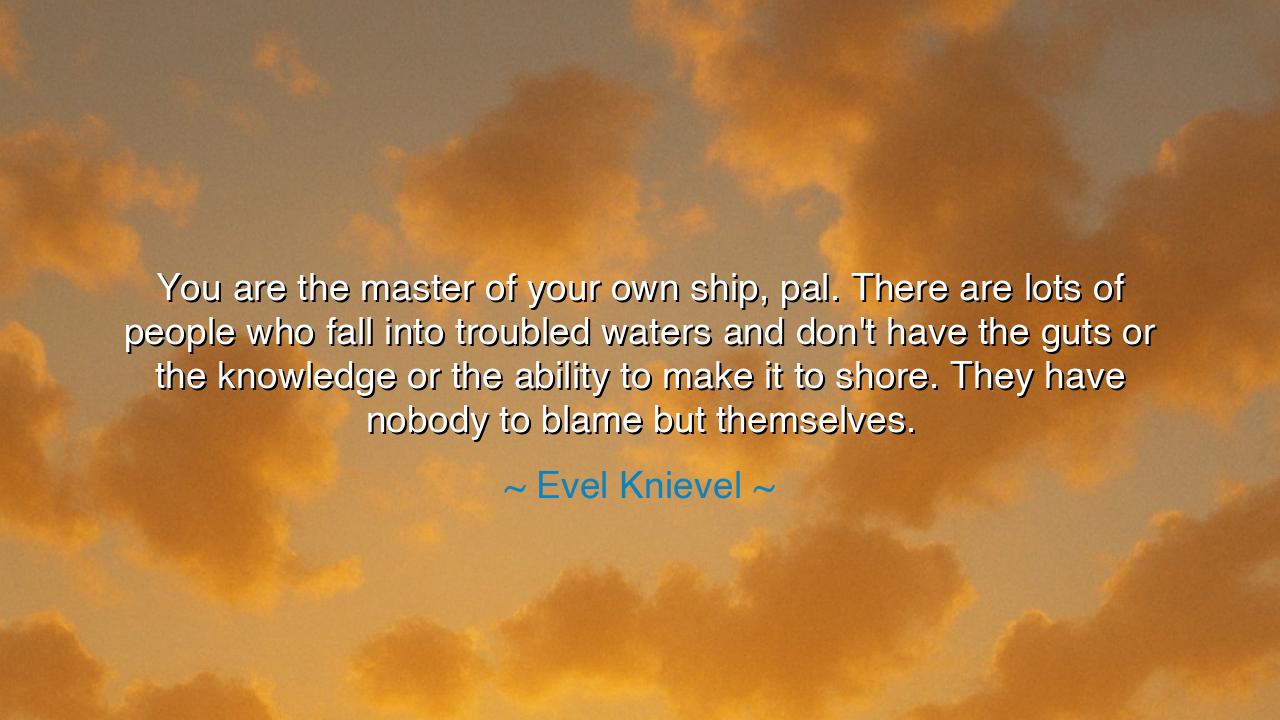
You are the master of your own ship, pal. There are lots of
You are the master of your own ship, pal. There are lots of people who fall into troubled waters and don't have the guts or the knowledge or the ability to make it to shore. They have nobody to blame but themselves.






“You are the master of your own ship, pal. There are lots of people who fall into troubled waters and don't have the guts or the knowledge or the ability to make it to shore. They have nobody to blame but themselves.” — Evel Knievel
In this rugged and unflinching declaration, Evel Knievel, the daredevil who defied gravity and fate itself, speaks the creed of self-reliance. Beneath the plain-spoken boldness of his words lies an ancient and eternal truth: every man is the captain of his own destiny, and the sea he sails is life itself. To be the master of your own ship is to accept full command over your choices, your fears, and your fate. No storm, no wave, no wind of circumstance can strip that command away unless you surrender it yourself.
This philosophy has echoed through the ages. The Stoics of old—men like Epictetus and Marcus Aurelius—taught that while we cannot govern the winds, we can always adjust our sails. Knievel, though born of a later age and clad not in the robes of philosophers but in leather and fire, spoke the same wisdom. His life was one of daring leaps—some triumphant, some disastrous—but always his own. When he soared over the Snake River Canyon, he faced the abyss not only of danger but of doubt. Many called him foolish; others, fearless. Yet he stood unmoved, for he believed that to live without risk was to drift without purpose.
The troubled waters of which he speaks are the storms that test every soul: failure, loss, disappointment, fear. There are those who, when cast into these tempests, flail and curse the tides. They seek others to blame—the world, fortune, fate. But the truth, as Knievel knew, is that survival and triumph depend on guts, knowledge, and ability—the courage to act, the wisdom to learn, and the strength to endure. The sea does not pity the sailor; it rewards only those who steer with resolve.
Consider the tale of Ernest Shackleton, the explorer whose ship, Endurance, was crushed in the ice of Antarctica. Surrounded by deathly cold and despair, he did not surrender to panic or blame. Instead, he took command of his men and himself. Through relentless courage and clear leadership, he guided every soul back to safety. He proved that even in the most hopeless sea, the master of his own ship can chart a way home. Shackleton and Knievel—men of different worlds—were kindred spirits in this truth: that no one can save a man who refuses to save himself.
Knievel’s words also carry a warning, sharp as salt in a wound: “They have nobody to blame but themselves.” It is not cruelty but honesty. The ancients would call it the law of responsibility—the law that says a man’s life is the sum of his own choices. Fortune may deal unfair cards, yes, but how one plays them determines victory or defeat. The weak spirit surrenders to bitterness; the strong learns, adapts, and continues forward. To blame others is to abandon the helm, to let your ship drift into the rocks. But to take responsibility is to seize the wheel and steer again toward hope.
So, what lesson must we draw from this hard and shining wisdom? It is that life is a voyage, and every person must be both captain and crew. You must train your mind, strengthen your courage, and study the stars of principle and purpose. When storms come—and they will—you must not curse the waves. Instead, tighten your ropes, repair your sails, and steer onward. The sea respects not complaints, but command.
Therefore, live boldly, as Evel Knievel lived—unafraid to fall, unashamed to rise. Trust in your ability to rebuild when the world breaks you. Learn from failure, but never dwell in it. Take full ownership of your course, for that is where freedom begins. Be the master of your own ship, and though you may face storms and darkness, you will also know the joy of reaching distant shores by the strength of your own hand.
For in the end, it is not fate, nor fortune, nor the world that determines where you arrive—it is your courage to steer through the tempest, and your faith that, though the seas may rage, you were born to sail them.






AAdministratorAdministrator
Welcome, honored guests. Please leave a comment, we will respond soon